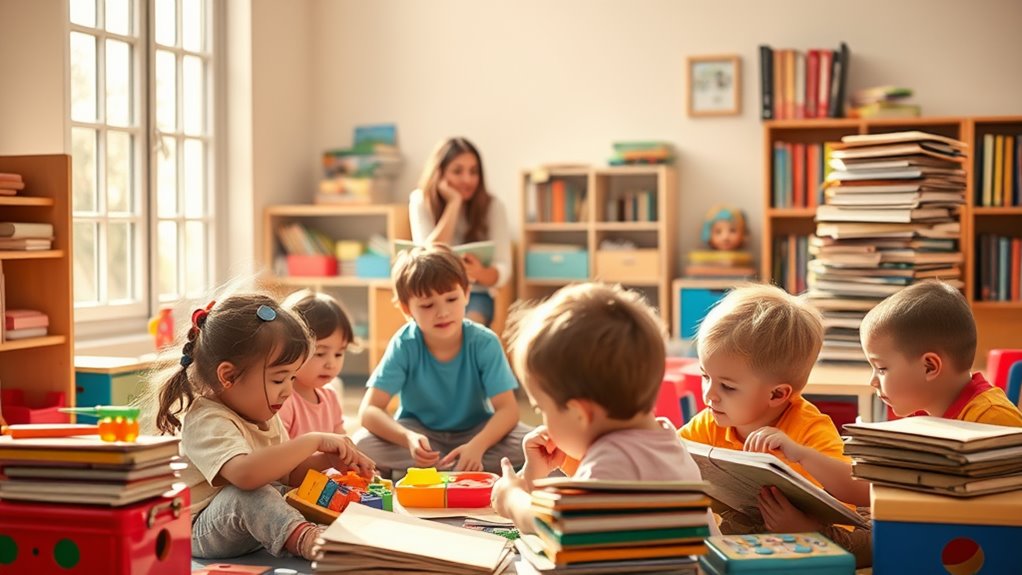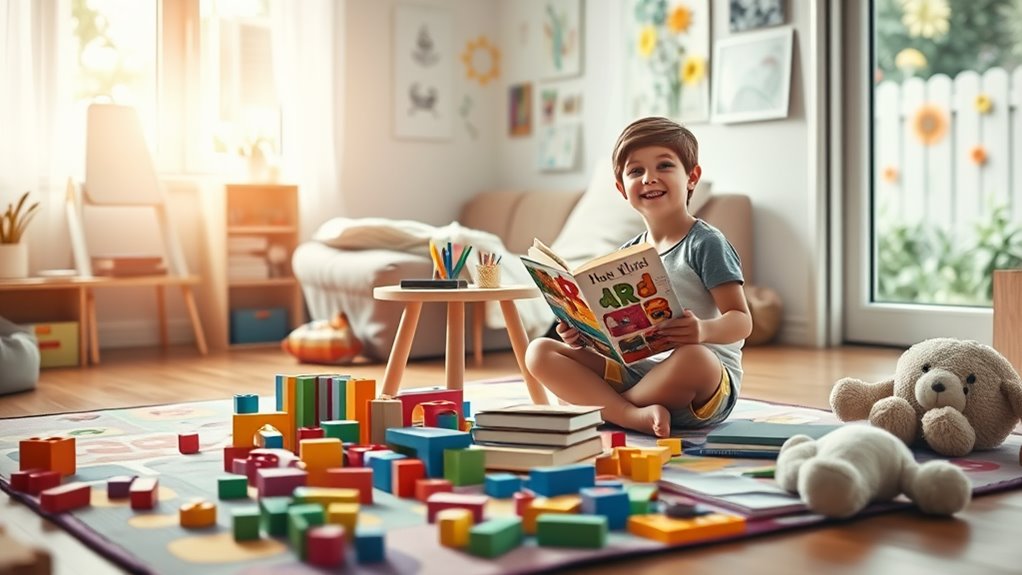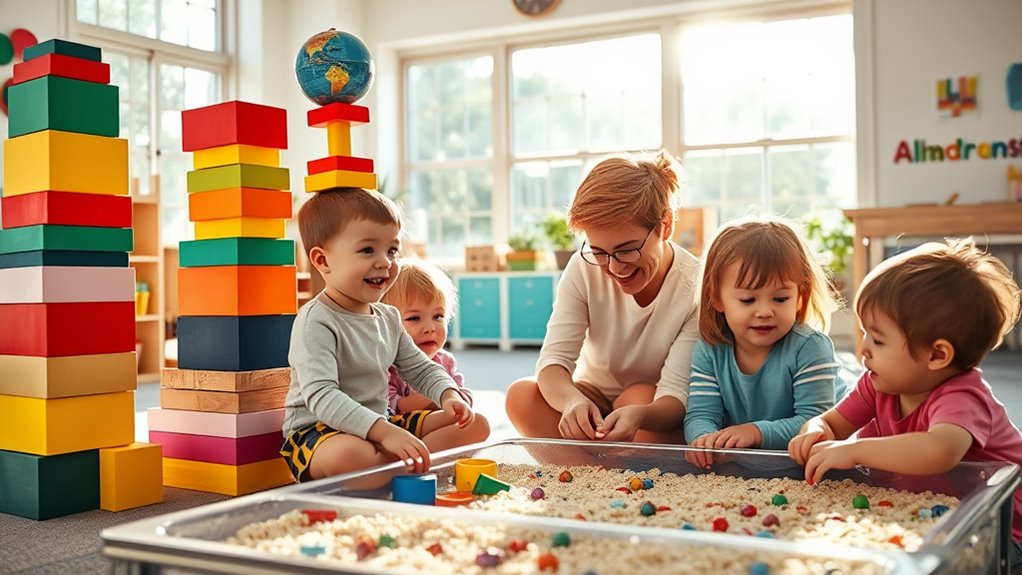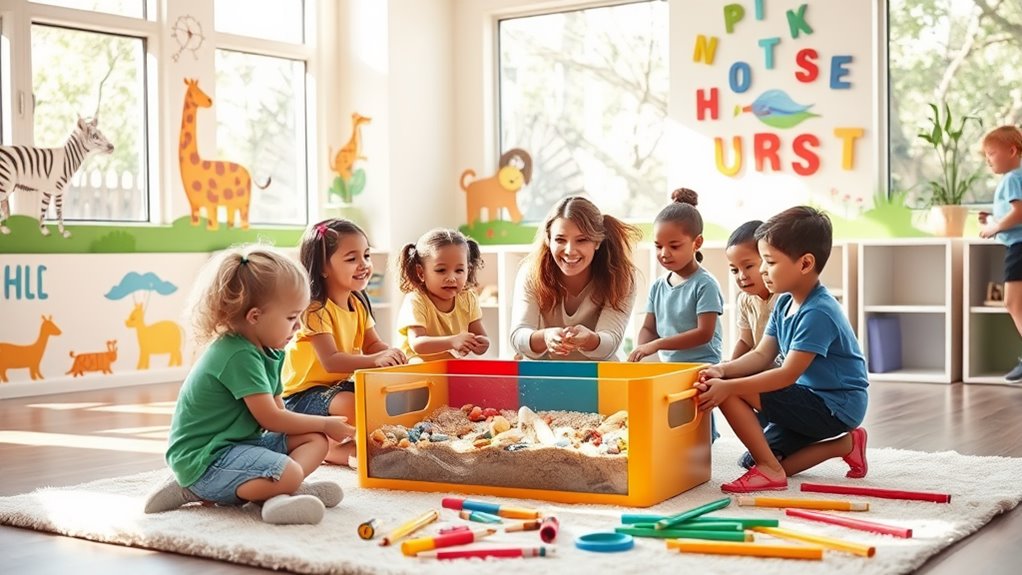Early Childhood Education Myths That Are Holding Kids Back!
Myths about early childhood education can really hold your child back. Many believe that playtime isn’t learning, but it actually promotes creativity, problem-solving, and social skills. Others think early academic pressure is crucial; however, it stifles curiosity and can diminish the joy of learning. You might also think all kids learn the same way, but tailoring approaches to individual styles enhances engagement. And don’t overlook the importance of parental involvement and the role of teachers in creating nurturing environments. By understanding these myths, you can significantly boost your child’s development and readiness for future challenges. There’s so much more to explore!
Key Takeaways
- Early academic pressure can hinder children’s natural curiosity and diminish their love for learning, limiting their potential.
- Emphasizing rote memorization over exploration stifles creativity and critical thinking, essential for holistic development.
- Standardized testing reduces a child’s unique abilities to a single score, overlooking their diverse talents and skills.
- Ignoring individual learning differences may prevent tailored teaching strategies that enhance engagement and understanding among children.
- Underestimating the importance of play in learning undermines cognitive, social, and emotional development crucial for lifelong success.
Myth: Playtime Is Not Learning
Playtime is often dismissed as mere fun, but the truth is, it’s a vital component of learning. During play, kids engage in activities that significantly enhance their cognitive development. When they manipulate toys, solve puzzles, or create imaginative scenarios, they’re not just passing the time; they’re developing critical thinking skills, problem-solving abilities, and creativity.
Moreover, playtime serves as a crucial opportunity to build social skills. Interacting with peers during games teaches children about cooperation, negotiation, and empathy. They learn to navigate conflicts, share resources, and take turns, all of which are essential for healthy social relationships later in life.
As a caregiver or educator, it’s essential to recognize that play is an active learning process. By providing rich, engaging environments and opportunities for play, you’re not only supporting cognitive growth but also nurturing their emotional and social well-being. So, next time you observe children playing, remember: they’re not just having fun; they’re mastering a multitude of skills that set the foundation for lifelong learning. Embrace playtime as a powerful tool in their early education journey.
Myth: Early Academic Rigor Is Essential
Many people believe that introducing children to rigorous academic content at an early age is the best way to ensure their future success. However, this myth can lead to unnecessary academic pressure that may stifle a child’s natural curiosity and love for learning. Early development thrives in environments where exploration and creativity are prioritized over structured academic demands.
When you push for early academic rigor, you risk overlooking the critical social, emotional, and cognitive skills that children develop through play and interaction. Research shows that children who engage in hands-on learning experiences tend to perform better in traditional academic settings later on. They build resilience, problem-solving abilities, and a lifelong passion for knowledge—all essential for success beyond the classroom.
Instead of focusing solely on early academic skills, consider fostering an environment that encourages exploration and imaginative play. Support activities that allow your child to ask questions, experiment, and learn at their own pace. By doing so, you’ll ultimately provide a foundation for true mastery and a love for learning, rather than simply preparing them for standardized tests.
Myth: All Children Learn the Same Way
Learning styles vary significantly among children, and assuming that all kids absorb information in the same way can be misleading. Each child brings a unique set of strengths, preferences, and experiences that shape their individual learning styles. Some might thrive in hands-on activities, while others excel through visual aids or auditory instruction. Recognizing these differences is crucial.
By embracing diverse strategies in your teaching approach, you can cater to the individual learning needs of each child. For instance, you may incorporate movement-based activities for those who learn best through kinesthetic means, while offering storytelling sessions for auditory learners. This tailored approach not only supports engagement but also fosters a deeper understanding of the material.
When you acknowledge that children learn differently, you empower them to explore and discover their own learning pathways. This flexibility cultivates a love for learning and allows each child to shine in their own way. Instead of trying to fit all children into a one-size-fits-all model, focus on nurturing their individual strengths. Your commitment to recognizing and celebrating these differences will lead to more effective and enriching educational experiences for every child in your care.
Myth: Standardized Testing Is Beneficial
Standardized testing might seem like a straightforward way to measure student achievement, but it often overlooks the diverse strengths and abilities of young learners. In early childhood education, these tests can create a narrow view of a child’s potential, reducing their unique talents to a single score. Instead of fostering a love for learning, standardized testing can induce anxiety and discourage creativity.
Young children develop at different rates, and their learning styles vary widely. Standardized tests typically emphasize rote memorization and basic skills, which might not reflect a child’s true understanding or capabilities. You want to nurture holistic development, where critical thinking and problem-solving are prioritized over test scores.
Moreover, standardized testing can lead to teaching to the test, where educators focus on test preparation rather than enriching the curriculum. This approach can stifle curiosity and diminish the joy of learning, which is crucial in early childhood.
Instead of relying on standardized testing, consider alternative assessments that capture a child’s growth and learning journey. By embracing diverse evaluation methods, you can support each child’s individual path to mastery and create a more inclusive and effective early childhood education environment.
Myth: Parental Involvement Is Overrated
You might think that parental involvement isn’t that crucial, but research shows it plays a significant role in a child’s learning journey. Engaging with your child’s education not only enhances their academic performance but also strengthens the vital relationship between you and their teachers. When parents and educators work together, kids thrive.
Importance of Engagement
While some may argue that parental involvement isn’t crucial to a child’s education, research consistently shows the opposite. Your active participation lays the groundwork for effective engagement strategies that enhance your child’s learning experience. When you engage with your child’s education, it fosters a sense of security and motivation, igniting their curiosity and desire to learn.
Implementing engagement strategies, like reading together or discussing school projects, creates a strong connection between home and school. This connection not only reinforces what your child learns but also empowers them to view education as a collaborative effort. By being actively involved, you model the importance of education, encouraging your child to value their own learning process.
Moreover, your engagement sends a clear message: education matters. Children thrive when they see their parents invested in their academic journey, leading to increased confidence and resilience. So, don’t underestimate your role. Your involvement is a powerful catalyst for your child’s growth and development. By prioritizing engagement, you’re not just supporting your child academically; you’re also nurturing a lifelong love for learning that will serve them well into the future.
Impact on Learning
Many believe that parental involvement is overrated, but this misconception undermines the profound impact active participation has on a child’s learning journey. When you engage in your child’s education, you’re not just a spectator; you’re a vital contributor to their cognitive development. Research demonstrates that children with involved parents perform better academically and exhibit enhanced problem-solving skills.
An effective impact assessment shows that parental engagement can lead to significant improvements in a child’s emotional and social development as well. When you read together, help with homework, or discuss their day, you’re reinforcing essential skills that build their academic foundation. This isn’t just about grades; it’s about nurturing a love for learning and curiosity.
Moreover, your involvement sets a strong example, demonstrating the value of education and effort. Children learn best in environments where they feel supported and understood. By being actively present, you cultivate a sense of security and motivation, which directly influences their attitude toward learning.
Strengthening Parent-Teacher Relationships
Building a strong parent-teacher relationship is key to enhancing a child’s educational experience, yet the myth that parental involvement is overrated often undermines this partnership. You might not realize how vital your role is in supporting your child’s learning environment. By actively engaging, you create a network of support that fosters trust building between you and the educator.
Effective communication strategies are essential in this process. Regular check-ins, whether through emails, phone calls, or parent-teacher conferences, can help you stay informed about your child’s progress. Sharing insights about your child’s interests and challenges can empower teachers to tailor their approach, ensuring your child receives the best possible care.
Moreover, showing appreciation for teachers’ efforts reinforces the bond. Simple gestures, like a thank-you note or volunteering for classroom activities, can go a long way in building rapport. When both parties feel valued and understood, it cultivates an environment where children thrive academically and socially.
Myth: Preschool Is Just Daycare
It’s easy to think of preschool as just a place to drop off your child while you go about your day, but that couldn’t be further from the truth. In reality, preschools offer valuable learning through play, developmental skill building, and a structured curriculum that prepares kids for their future. Understanding this difference can help you appreciate the essential role preschool plays in your child’s early development.
Learning Through Play
A common misconception is that preschool merely serves as a form of daycare, but this viewpoint overlooks the rich educational experiences embedded in early childhood programs. Learning through play is a fundamental aspect of preschool, where children engage in imaginative play that fosters creativity and critical thinking. This hands-on approach encourages them to explore their environment, experiment with new ideas, and develop problem-solving skills.
Moreover, preschool provides invaluable opportunities for social interaction. Through collaborative play and group activities, children learn to communicate effectively, share resources, and navigate relationships. These interactions are vital for developing emotional intelligence and empathy, helping kids understand their own feelings and those of others.
When you recognize the importance of play in early childhood education, you empower your child’s learning journey. It’s not just about keeping them occupied; it’s about laying a strong foundation for lifelong learning. By valuing imaginative play and social interactions, you’ll see how preschool is far more than mere daycare—it’s a crucial stepping stone in your child’s development, equipping them with the skills they need to thrive both academically and socially.
Developmental Skill Building
Many parents underestimate the developmental skill building that occurs in preschool, mistakenly viewing it as just a place for supervision. In reality, preschool plays a crucial role in enhancing your child’s motor skills and social development. Through various activities like arts and crafts, kids refine their fine motor skills, learning to grip scissors or manipulate small objects. These skills are foundational, impacting their ability to write, draw, and engage in daily tasks.
Moreover, preschool is a dynamic environment where children interact with peers, fostering essential social development. They learn to share, take turns, and navigate conflicts—all vital skills for future relationships. This interaction encourages emotional intelligence, helping them understand their feelings and those of others.
Structured Curriculum Benefits
Preschool offers much more than simple supervision; it provides a structured curriculum designed to promote learning and development. This curriculum isn’t one-size-fits-all; it incorporates curriculum flexibility to cater to each child’s unique needs. Here’s how a structured curriculum benefits your child:
-
Individualized Learning: Structured programs tailor activities to fit your child’s interests and developmental stage, ensuring they engage fully and learn effectively.
-
Skill Development: A well-organized curriculum focuses on key areas such as literacy, numeracy, and social skills, helping your child build a strong foundation for future learning.
-
Consistent Routine: The predictability of a structured day helps children feel secure and understand expectations, which fosters confidence and independence.
When you choose preschool, you’re investing in a powerful framework that nurtures your child’s growth. They won’t just be playing; they’ll be learning in ways that prepare them for success in school and beyond. With a focus on curriculum flexibility and individualized learning, preschool lays the groundwork for a lifetime of curiosity and achievement. Embrace the benefits of structured learning—your child deserves it!
Myth: Teachers Are Not Crucial in Early Years
Research consistently shows that teachers play a vital role in early childhood education, shaping children’s social, emotional, and cognitive development. It’s a common myth that teachers aren’t crucial during these formative years, but nothing could be further from the truth. Your child’s early development hinges on the positive teacher influence they receive in the classroom.
Effective teachers create nurturing environments where children feel safe to explore and learn. They facilitate interactions that help kids develop essential social skills, fostering cooperation, empathy, and communication. Moreover, skilled educators tailor their approaches to meet individual needs, ensuring that each child thrives.
In these early years, when brain development is at its peak, a teacher’s guidance and support are irreplaceable. They introduce concepts through engaging activities, laying the groundwork for lifelong learning. This is where the foundation for critical thinking, problem-solving, and creativity is built.
Frequently Asked Questions
How Can I Choose the Right Preschool for My Child?
When choosing the right preschool for your child, evaluate the preschool curriculum and ensure it aligns with your values. Consider schools that encourage parent involvement, fostering a strong partnership between home and education for your child’s success.
What Skills Should My Child Develop Before Kindergarten?
Before kindergarten, your child’s gotta develop literacy skills like recognizing letters and sounds, plus emotional regulation to handle feelings. These foundational skills set them up for success and help them thrive in a classroom environment.
How Do I Support My Child’s Learning at Home?
To support your child’s learning at home, establish daily reading routines and incorporate fun learning games. These activities spark curiosity, enhance literacy skills, and foster a love for learning, setting a strong foundation for future success.
What Are the Signs of a High-Quality Early Childhood Program?
To identify a high-quality early childhood program, look for clear curriculum standards and well-qualified teachers. Engaging activities and a nurturing environment also enhance learning, ensuring your child thrives in their educational journey.
How Can I Encourage My Child’s Social Skills Through Play?
Play’s a vibrant canvas where your child can paint social skills. Encourage playful interactions through cooperative games, fostering teamwork and communication. Join in the fun, and watch their confidence blossom like a flower in spring.




